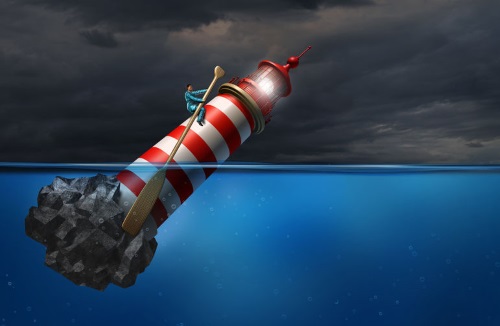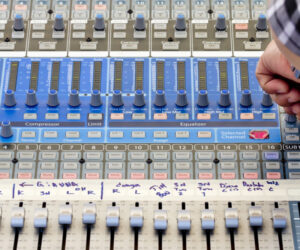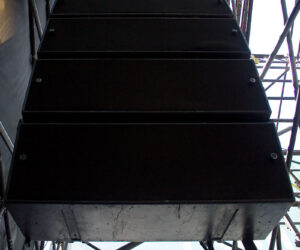In a previous article I discussed the question of whether or not anyone could learn live sound engineering skills. The subsequent feedback I received led to another musing: Why would anyone want to become a live sound engineer?
Looking at it from afar, it seems like an illogical choice. First, there’s no formal education that is required for the profession. Sure, there are programs and schools that teach what we do, but the reality is that one can just as easily be self taught.
There are no requirements of follow-up courses, no systematic approach to checking whether our knowledge of audio grants us access to the shiny knobs and buttons of a mixing console or the lack of it puts us back to running cables and unloading racks from the truck. In fact, the only thing that makes someone a live engineer is the claim “that’s what I do,” with the market judging our ability by either hiring us – or not.
The second argument, and it’s one that concerned parents can use when their kids choose live sound engineering as their path in life, is the fact that in most cases, we’re severely overworked and grossly underpaid. The hours can be brutal, especially for small production companies where the team must also set up and strike the system.
Waking up in the middle of the night to load the truck, drive to the venue and set everything up, and then being mentally and physically depleted by the time the sound check starts and it’s time to do our best work. It requires maintaining high levels of focus for hours on end, especially during festival season where sound checks can start at 10 am and the last act finishes up at 4 am the next day.
After all the load-it-all-in and tear-it-all-down tasks, where we constantly think that surely we’ve not laid down as many cables as we’re now having to clean up, followed by loading all the racks (which, just like the cables, seem somehow much heavier than we remember), then driving back to the warehouse, unloading the truck, catching a few hours of sleep – and then it’s time do it all again the next day. Factor in travel times, road closures, weather conditions, grumpy organizers and fast food, sprinkled with high levels of stress and constantly working against the clock – I mean, really? That is what we want to do in life?
And yet for many of us, the answer is an unequivocal “yes.” Granted, there will be always be a lot of people who try it and quickly figure out it’s not for them. Rental companies often take on people for a probational period, and not a lot of them return the following season (some don’t even return for the next gig). So what exactly is it that keeps us doing what we do? Obviously, I can’t speak for everyone, but here are my reasons.
Feeding The Addiction
One of the most prominent motivations that keeps me coming back is that I’m addicted to it. People who know me will tell you that I’m as vanilla as it gets – I don’t drink alcohol, coffee or energy drinks and don’t use recreational drugs, nothing of the sort. My “rush” comes every time I’m in front of a console and the show is about to start.
The bigger the show, the bigger the thrill, but it can be an act that I’ve worked with for years, with the same gear that I’ve used for them countless times, and with ample time for setup, checking and double-checking – the feeling still doesn’t go away. Even if there’s no evidence supporting the possibility of anything going wrong, this is live. There are no second takes, no edits, no cuts.
In that particular moment I have the responsibility of making the show happen, sometimes for thousands of people, and I always feel the pressure. However, I think that if you don’t feel the pressure, it might be time to get out. Complacency is our worst enemy in live sound.
I remember a reply from veteran engineer Robert Scovill to a question about his biggest mistake in a live audio setting. Simply, he said, “Assuming anything.” I think it sums up our mindset perfectly. Even when it seems that nothing can go wrong, or maybe especially then, something might happen that can endanger the show, sometimes leaving us as the only people who know how to fix it and keep the show going.
This pressure isn’t for everyone; for some, it’s too much to bear. I’ve witnessed great studio engineers completely freeze up in live audio settings. It takes a specific type of personality that can remain calm under pressure, go into problem-solving mode and find a quick fix to either resolve or mask the issue so it’s not evident to the public. Those moments pump so much adrenaline through my system that I don’t need coffee, alcohol or drugs – I’m hooked on the live craft.
Community Of Peers
The live sound environment is often one of high stress, with a significant level of responsibility combined with time constrictions and often a severe lack of sleep.
If it sounds a bit like a military regime, it’s because it sometimes feels like it. And just like in the military, we have to count on the people next to us to help out, do their jobs and have our backs. True characters are revealed in these extreme conditions, and bonds are forged that are strong and long lasting.
Our community is comprised of people who share the same goal of making the show happen by any means necessary and being content with our invisibility – we’ve done our job well when no one notices we’re there. Through those shared goals we’re able to work those long hours and still stand at the end of the day.
Sure, everyone has off days when they don’t work well with others or personal issues creep into the work environment; we’re all human, after all. But most of the time there’s a good-natured humor that blankets the team, and if that doesn’t help, early morning venting helps in blowing off steam and leaves us feeling better when sharing some of the frustrations with the only people that actually know first-hand how we feel – our comrades in arms.
Marriage Of Arts & Tech
Working in live sound also feeds some of my passions in life, one of them my love for music and sound and the other my interest in technology and gadgets. This environment is a perfect marriage of arts and tech, allowing me to be ethereal and creative on one hand and logical and technical on the other. It occupies both sides of my brain and forces me to stay on top of the latest developments in both music production and tech innovation.
Putting it bluntly, I’m a bit of a geek, and playing with new consoles, discovering new technological tools at my disposal and testing new gear is a great source of joy for me. And there are variations on this theme – some folks are more interested in IT and networking, others are more focused on exploring the latest musical instruments. But if you share this desire to bridge the gap between the artistic and the technical, then live sound might be right up your alley.
The Cool Factor
This last category might be completely made up and in my head only. But I think that there’s still a public perception that being a sound engineer is “cool.” It’s a profession that still hasn’t anchored itself completely in the general public’s eye as a worthy career pursuit, and that brings a bit of mystique.
This is fueled by the fact that very few people realize the full scope of what we do, since they only see (and hear) a very tiny portion of it. It’s by no means as awesome as being a race car driver or a hand model or whatever one’s definition of the coolest job on earth might be, but it should still score some points when you introduce yourself with that title. (Then again, it could just be me.)
Anyone thinking about getting into our profession should know this: you really have to love it to keep doing it long term. It will demand a lot from you, sometimes more than you’re willing to give. But it’s also immensely rewarding and exciting, and that’s why I, for one, keep coming back.















